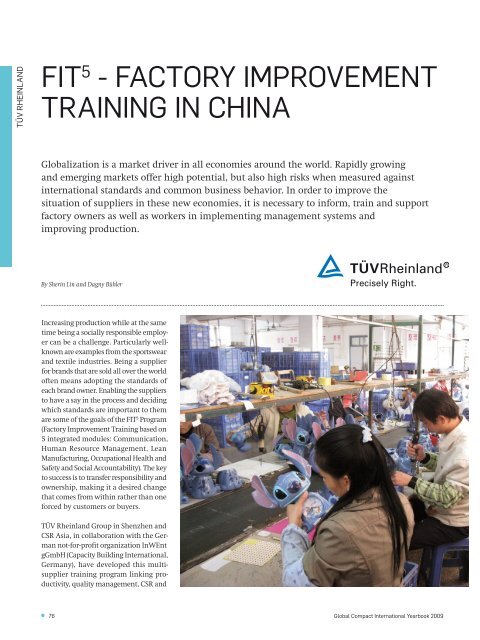Global Compact International Yearbook 2009
The road to Copenhagen is the catchphrase: Climate Change is the top issue of inaugural edition, on the market since 1th of august 2009. In a very personal and exclusive foreword, UN Secretary-General Ban Ki-moon stresses the urgency of multilateral action: „One underlying message of this Yearbook is that a global, low-carbon economy is not only technologically possible, it makes good business sense“, said Ban. „We need the voice and energy of business to help us combat climate change.“ Sir Anthony Giddens adds the importance of the upcoming Copenhagen Climate Summit: „It is an important year, and everybody knows it because it is the year of Copenhagen. It’s a key for climate change policy. I do hope the Copenhagen negotiations will be successful, but there are reasons I have to be worried. “ Another key issue of this edition is the global economic crisis: 2008 will be remembered as the year of crises. The breakdown of financial institutions and markets and the subsequent worldwide economic downturn have put the spotlight on issues that the United Nations Global Compact has long advocated as essential responsibilities for modern business and today’s global markets: comprehensive risk management, long-term performance, and ethics. Georg Kell, Executive Director of the Global Compact, writes: „Restoring confidence and trust in markets requires a shift to long-term sustainable value creation, and corporate responsibility must be an instrument towards this end. If the crisis is any indication, it is now time to build on the advances made over the past 10 years by companies and investors in the area of ESG performance and bring this discipline to the mainstream. “
The road to Copenhagen is the catchphrase: Climate Change is the top issue of inaugural edition, on the market since 1th of august 2009. In a very personal and exclusive foreword, UN Secretary-General Ban Ki-moon stresses the urgency of multilateral action: „One underlying message of this Yearbook is that a global, low-carbon economy is not only technologically possible, it makes good business sense“, said Ban. „We need the voice and energy of business to help us combat climate change.“ Sir Anthony Giddens adds the importance of the upcoming Copenhagen Climate Summit: „It is an important year, and everybody knows it because it is the year of Copenhagen. It’s a key for climate change policy. I do hope the Copenhagen negotiations will be successful, but there are reasons I have to be worried. “
Another key issue of this edition is the global economic crisis: 2008 will be remembered as the year of crises. The breakdown of financial institutions and markets and the subsequent worldwide economic downturn have put the spotlight on issues that the United Nations Global Compact has long advocated as essential responsibilities for modern business and today’s global markets: comprehensive risk management, long-term performance, and ethics. Georg Kell, Executive Director of the Global Compact, writes: „Restoring confidence and trust in markets requires a shift to long-term sustainable value creation, and corporate responsibility must be an instrument towards this end. If the crisis is any indication, it is now time to build on the advances made over the past 10 years by companies and investors in the area of ESG performance and bring this discipline to the mainstream. “
You also want an ePaper? Increase the reach of your titles
YUMPU automatically turns print PDFs into web optimized ePapers that Google loves.
TÜV Rheinland<br />
FIT 5 - Factory Improvement<br />
Training in China<br />
<strong>Global</strong>ization is a market driver in all economies around the world. Rapidly growing<br />
and emerging markets offer high potential, but also high risks when measured against<br />
international standards and common business behavior. In order to improve the<br />
situation of suppliers in these new economies, it is necessary to inform, train and support<br />
factory owners as well as workers in implementing management systems and<br />
improving production.<br />
By Sherin Lin and Dagny Bühler<br />
Increasing production while at the same<br />
time being a socially responsible employer<br />
can be a challenge. Particularly wellknown<br />
are examples from the sportswear<br />
and textile industries. Being a supplier<br />
for brands that are sold all over the world<br />
often means adopting the standards of<br />
each brand owner. Enabling the suppliers<br />
to have a say in the process and deciding<br />
which standards are important to them<br />
are some of the goals of the FIT 5 Program<br />
(Factory Improvement Training based on<br />
5 integrated modules: Communication,<br />
Human Resource Management, Lean<br />
Manufacturing, Occupational Health and<br />
Safety and Social Accountability). The key<br />
to success is to transfer responsibility and<br />
ownership, making it a desired change<br />
that comes from within rather than one<br />
forced by customers or buyers.<br />
TÜV Rheinland Group in Shenzhen and<br />
CSR Asia, in collaboration with the German<br />
not-for-profit organization InWEnt<br />
gGmbH (Capacity Building <strong>International</strong>,<br />
Germany), have developed this multisupplier<br />
training program linking productivity,<br />
quality management, CSR and<br />
76<br />
<strong>Global</strong> <strong>Compact</strong> <strong>International</strong> <strong>Yearbook</strong> <strong>2009</strong>

















